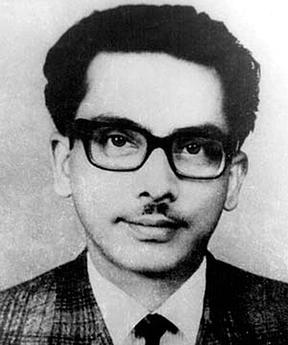Tahir Mirza was a senior Pakistani journalist and former editor of Dawn, Pakistan's oldest and most widely circulated English-language newspaper. He became resident editor of this newspaper in Lahore in 1994 and worked as a correspondent in Washington, DC, before becoming editor of the newspaper in Karachi after the retirement of its noted editor Ahmed Ali Khan in 2003.
Hasan Abidi was a Pakistani journalist, writer, political activist and an Urdu language poet.

Shahidullah Kaiser was a Bangladeshi novelist and writer. He was awarded Bangla Academy Literary Award in 1969, Ekushey Padak in 1983 and Independence Day Award in 1998.

Khaleej Times is a daily English language newspaper published in Dubai, United Arab Emirates. Launched on 16 April 1978, Khaleej Times is the UAE's longest-running English daily newspaper.
Altaf Husain was an educationist, journalist, and Pakistan Movement activist. He is noted as one of the pioneers of print journalism in Pakistan and was the founding editor and the first editor-in-chief of English-language newspaper, Dawn, which he edited for almost twenty years.
Khaled Al Maeena is a veteran Saudi journalist, commentator, businessman and the former editor-in-chief of the Saudi Gazette. He is regarded as a liberal. He is also the patron of Muslim Mirror.

Mahfuz Anam is a Bangladeshi journalist. He serves as editor and publisher of The Daily Star, one of Bangladesh's largest circulating English-language newspapers. After working in the United Nations for 14 years, Anam co-founded the newspaper with his mentor Syed Mohammad Ali in 1991 during Bangladesh's democratic transition. His criticism of the country's two largest political parties and the military has often resulted in him being sued; Anam dismisses the charges and the suits as attacks on press freedom. He was elected for a second term as chairman of the Asia News Network in 2022 and 2023.
Ali Muhammad Rashdi (Urdu: پیر علی محمد راشدی was a Pakistani writer, journalist, politician, parliamentarian, and diplomat. Notably, he served as Pakistan's ambassador to the Philippines from 1957 to 1961 and to China from 1961 to 1962. Rashdi also held ministerial positions in Sindh and served as the central minister for information and broadcasting, and the elder brother of scholar Hassam-ud-Din Rashidi.

Qazi Motahar Hossain was a Bangladeshi writer, scientist, statistician, chess player, and journalist.

Postage stamps of Pakistan are those issued since Pakistan's independence in 1947. Pakistan Post has issued more than 600 sets and singles totalling more than 1300 stamps. Immediately after the independence of Pakistan in 1947, the new Pakistan government was preoccupied with setting up the government so British Indian stamps continued in use without an overprint as was the practice in other countries.
Syed Muhammed Abul Faiz is a Bangladeshi academic. He served as the 26th vice-chancellor of the University of Dhaka serving from September 2002 until January 2009. Though an academic and a scientific researcher by profession, Abul Faiz was also the chairman of the Public Service Commission of Bangladesh before his tenure as the vice-chancellor.
Mahbūb Mahboob(also spelled Mahboob, or Mehboob, from Arabic: مَحبُوب, passed to other languages such as Urdu: محبوب is a masculine given name.
Bengalis in Pakistan are ethnic Bengali people who had lived in either West Pakistan or East Pakistan prior to 1971 or live in present-day Pakistan. Most Pakistani Bengalis, are bilingual speaking both Urdu and Bengali and are mainly settled in Karachi. Bengalis that arrived in Pakistan before 1971 have now assimilated with the Urdu-speaking people in Karachi.
Mahbub Ali Khan was a Bangladesh Navy rear admiral and the chief of naval staff from 1979 until his death in 1984. He is known for his heroic actions for his country. Under him, the South Talpatti sandbar and other emerging islands in the Bay of Bengal, over which both India and Bangladesh claimed sovereignty, remained under the authority of Bangladesh. He is also known for reducing piracy in the Bay of Bengal and was responsible for maintaining the security of the Bay and the Sundarbans.
The Civil and Military Gazette was a daily English-language newspaper founded in 1872 in British India. It was published from Lahore, Simla and Karachi, some times simultaneously, until its closure in 1963. The archives are owned by Lahore-based businessman Humayun Naseer Shaikh and have been digitized by Sharmeen Obaid-Chinoy's Citizens Archive of Pakistan.
Hassan Shahriar was a Bangladeshi journalist, columnist, and political analyst.
Syed Mahbub Murshed was a Bangladeshi lawyer and jurist. He served as the Chief Justice of East Pakistan High Court during 1964–1967.
Ahmad Ali Khan was a veteran Pakistani journalist who was also the editor of Dawn newspaper for 28 years.





